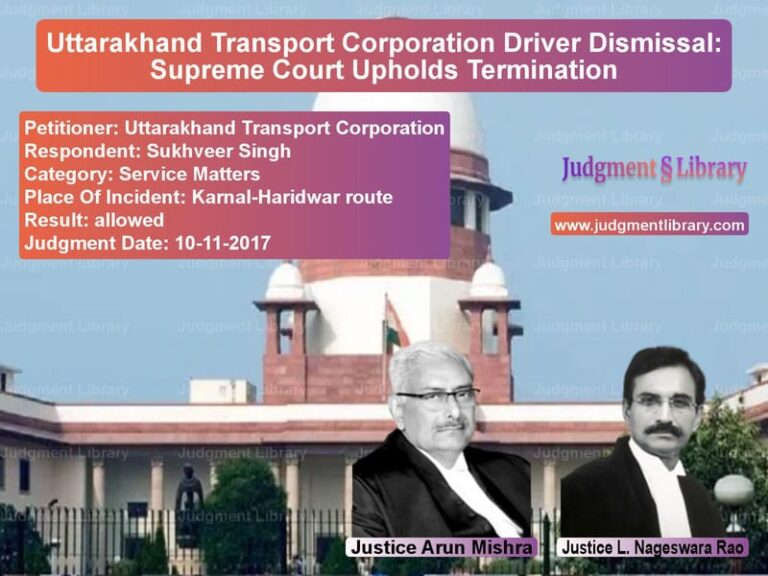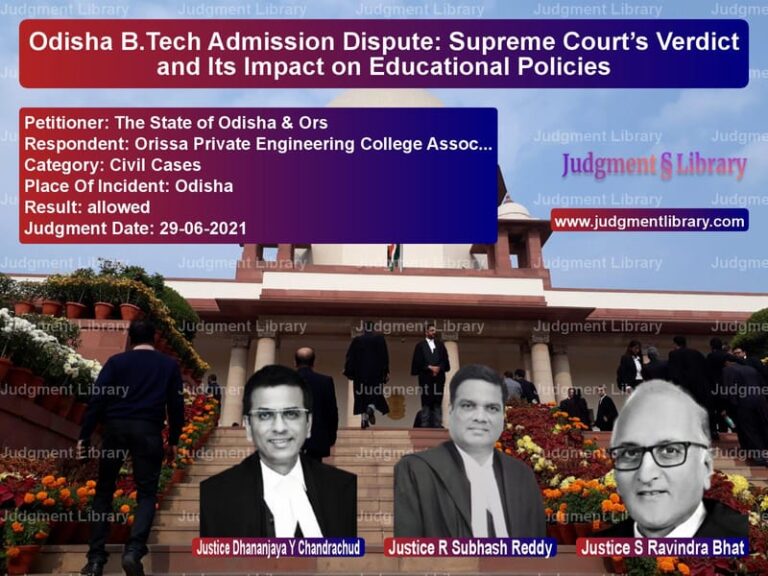Supreme Court Acquits Accused in Murder Case Due to Lack of Evidence
The Supreme Court of India recently delivered a judgment in the case of Chhote Lal v. Rohtash & Others, addressing issues of circumstantial evidence, eyewitness credibility, and the benefit of doubt in criminal cases. The appeal was filed by the complainant against the acquittal of six individuals previously convicted for murder under Sections 148, 201/149, and 302/149 of the Indian Penal Code (IPC).
Background of the Case
The case stemmed from a long-standing feud between two groups in Badshahpur, Haryana. The dispute, dating back to 1986, was related to public road access and had resulted in past violent incidents, including the murder of one of the complainant’s relatives, Ram Kishan. On November 4, 2000, the complainant, Chhote Lal, alleged that his son, Kishan Sarup, was abducted and later murdered by the accused.
According to the FIR:
- The incident occurred at 7:00 PM when Kishan Sarup was returning from duty.
- At a scooter stand in Badshahpur, the complainant met his son, and they traveled together on a motorcycle towards their village.
- A car intercepted them, forcing them off the road into the bushes.
- The accused exited the vehicle, attacked Kishan Sarup with knives and iron rods, and abducted him in the same car.
- The complainant filed a written report at the Badshahpur Police Post.
The next day, a partially burned body was found, and the complainant identified it as his son based on a copper ring and a belt buckle found at the scene.
Legal Issues Raised
- Was the complainant an eyewitness to the attack?
- Did the circumstantial evidence sufficiently establish the guilt of the accused?
- Did the High Court err in acquitting the accused after the Trial Court’s conviction?
Arguments of the Appellant (Chhote Lal)
- The complainant was an eyewitness to the abduction and attack.
- The accused had a history of enmity with the victim’s family.
- Despite the body being burned, the recovered items confirmed the victim’s identity.
- The High Court should have upheld the conviction given the weight of the circumstantial evidence.
Arguments of the Respondents (Accused)
- The complainant did not actually witness the murder.
- There were inconsistencies in the FIR and his testimony.
- The medical evidence showed that the victim was shot at close range, but the complainant never mentioned a firearm.
- The complainant’s claim that he was unable to intervene due to threats was unconvincing.
- The presence of the complainant at the scene of the abduction was doubtful.
Supreme Court’s Observations
1. Eyewitness Testimony Lacked Credibility
The Court found that the complainant’s testimony was unreliable:
“The complainant claims to have witnessed the attack but failed to explain why he did not attempt to stop the accused or seek immediate help. His passive behavior raises serious doubts about his presence at the scene.”
2. Discrepancies Between Testimony and Medical Evidence
The postmortem report indicated death by a close-range gunshot, whereas the complainant only mentioned knives and iron rods:
“If a firearm was used, why was it not mentioned in the FIR? The absence of this crucial detail casts serious doubts on the prosecution’s case.”
3. Circumstantial Evidence Was Inconclusive
While the complainant identified the body based on personal items, the Court held that this alone was insufficient to establish the identity beyond doubt.
4. Benefit of Doubt Must Be Given to the Accused
The Court reiterated that a conviction must be based on evidence that proves guilt beyond reasonable doubt:
“Where two views are possible, the court must lean in favor of the accused.”
Final Judgment
- The Supreme Court dismissed the appeal.
- The High Court’s acquittal of the accused was upheld.
- The accused were granted the benefit of doubt due to inconsistencies in evidence.
Key Takeaways
1. Eyewitness Testimony Must Be Reliable
The Court emphasized that inconsistencies and unexplained inaction by witnesses weaken the prosecution’s case.
2. Circumstantial Evidence Must Form a Complete Chain
A conviction cannot be based on incomplete circumstantial evidence.
3. Discrepancies Between Medical and Eyewitness Evidence Are Fatal
If medical reports contradict witness statements, courts must give the accused the benefit of the doubt.
4. Courts Must Avoid Convictions Based on Suspicion
The ruling reinforces that mere suspicion is not a substitute for proof beyond reasonable doubt.
Conclusion
The Supreme Court’s ruling in this case sets a precedent for how courts should handle murder cases based on circumstantial evidence. It highlights the importance of consistency in witness testimonies and forensic evidence, ensuring that convictions are based on solid legal grounds. This judgment serves as a crucial reminder that the burden of proof lies on the prosecution, and any doubts must favor the accused.
Petitioner Name: Chhote Lal.Respondent Name: Rohtash & Others.Judgment By: Justice Abhay S. Oka, Justice Pankaj Mithal.Place Of Incident: Badshahpur, Haryana.Judgment Date: 13-12-2023.
Don’t miss out on the full details! Download the complete judgment in PDF format below and gain valuable insights instantly!
Download Judgment: chhote-lal-vs-rohtash-&-others-supreme-court-of-india-judgment-dated-13-12-2023.pdf
Directly Download Judgment: Directly download this Judgment
See all petitions in Murder Cases
See all petitions in Bail and Anticipatory Bail
See all petitions in Judgment by Abhay S. Oka
See all petitions in Judgment by Pankaj Mithal
See all petitions in dismissed
See all petitions in supreme court of India judgments December 2023
See all petitions in 2023 judgments
See all posts in Criminal Cases Category
See all allowed petitions in Criminal Cases Category
See all Dismissed petitions in Criminal Cases Category
See all partially allowed petitions in Criminal Cases Category







